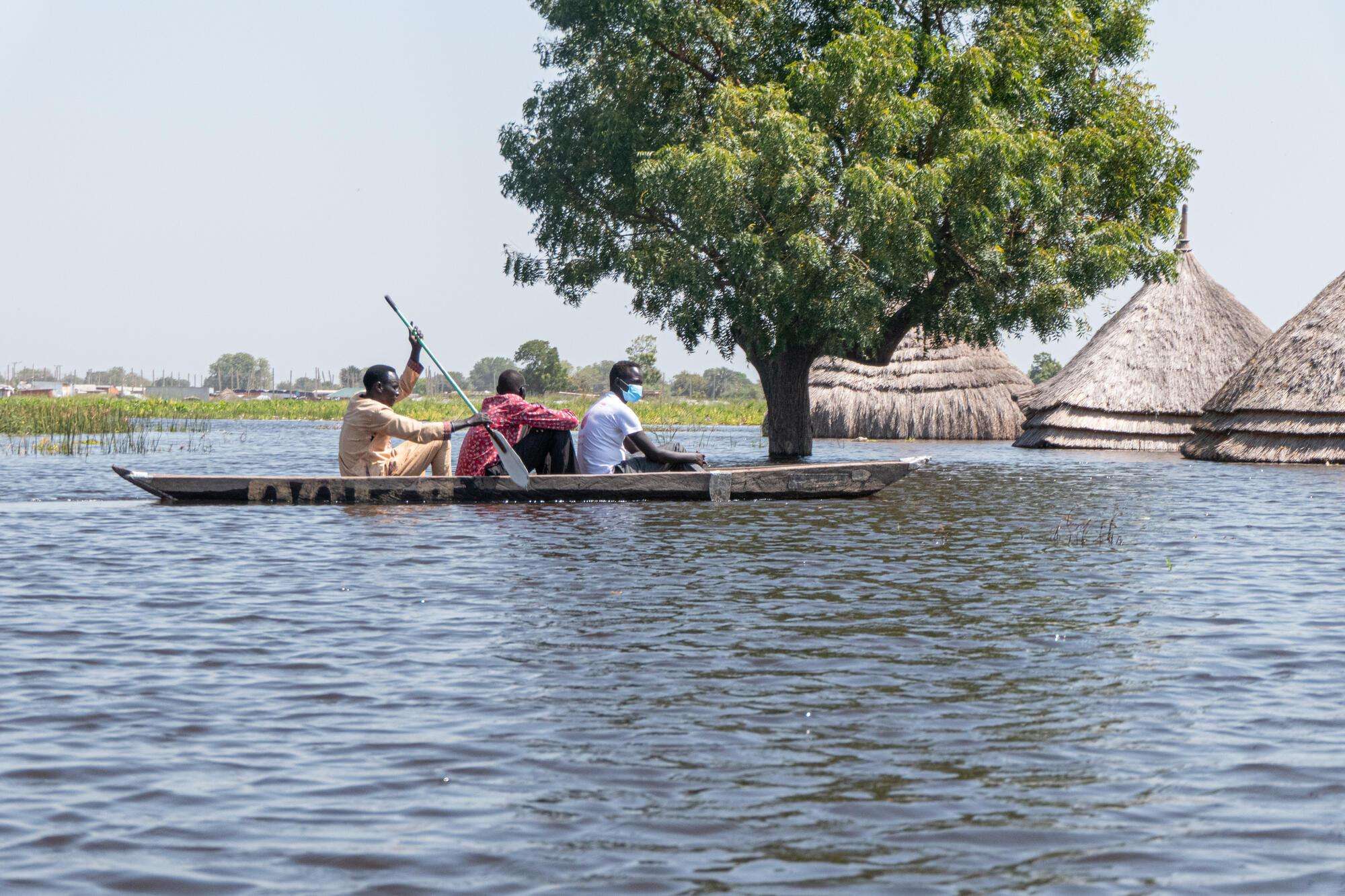JUBA, South Sudan/NEW YORK, November 23, 2021—Severe floods are endangering more than 150,000 displaced people who are living in abhorrent conditions around the town of Bentiu, Doctors Without Borders/Médecins Sans Frontières (MSF) warned today, urging humanitarian organizations, UN agencies, and governmental authorities to meet vital needs for food, water, sanitation, shelter and health care.
For the third year, historic floods have struck a wide swathe of South Sudan, and areas around Bentiu, the capital of Unity state, are now among the most affected. The already massive Bentiu camp for those displaced by conflict in South Sudan has grown by 12,000 people in recent months, bringing the number of people sheltering there in extremely unsanitary conditions to at least 120,000. Another 32,000 people have fled floodwaters in the surrounding villages and counties of Guit and Nhyaldu and are living in four makeshift camps in Bentiu town.

"The dangerously slow and inadequate humanitarian response to this crisis is putting lives at risk," said Will Turner, MSF emergency operations manager. "The deplorable situation inside Bentiu displacement camp—formerly a UN Protection of Civilians site—is not a new phenomenon. For years, we have repeatedly warned about the dire conditions, yet other organizations and agencies responsible for the water and sanitation services in the camp have not sufficiently increased or adjusted their activities. This paralysis is resulting in horrific living conditions and huge health risks for the people living in Bentiu camp and across makeshift camps in Bentiu town."
A perfect storm for disease outbreaks
In Bentiu camp, the sewage treatment site has been cut off for weeks by floodwater, affecting nearly all the camp's latrines. As more people arrive due to the flooding, waste from overflowing latrines is seeping into open drains. People do not have enough water or options for water storage, and there is no garbage collection, while dead goats and dogs are left rotting in the drainage systems.
With the conditions further worsened by the influx of new arrivals, people are at higher risk of outbreaks and waterborne diseases such as acute watery diarrhea, cholera, and malaria.
Meanwhile, at the camps in Bentiu town, the number of patients with malaria is extremely worrisome, with about 60 percent of MSF's mobile clinic consultations now focused on malaria patients. When the waters recede, it creates a perfect breeding ground for mosquitos, and most people in the camps do not have mosquito nets, leaving them dangerously exposed to the disease. MSF's medical teams are also starting to see an increase in acute watery diarrhea in some of the camps, likely due to the poor water and sanitation conditions.
Enormous medical needs
With the influx, the MSF hospital serving the people of Bentiu camp is now stretched beyond its capacity. MSF has added 45 extra beds to the existing 135-bed hospital, which saw a 35 percent increase in admissions from August to October.
So far in November, MSF's teams have seen an average of 180 patients per day. The majority are children under the age of five suffering from malaria, respiratory tract infections, and malnutrition.
"We are extremely concerned about malnutrition," said Jacob Goldberg, MSF emergency medical manager. "Severe acute malnutrition levels are two times the WHO's emergency threshold, and the number of children admitted to our hospital with severe malnutrition doubled since the start of the floods. With the hospital completely full, if there is a large outbreak of an infectious or waterborne disease, we won't have enough space to properly respond."
Urgent action needed
MSF has quickly scaled up activities in response to the flooding, with an emergency team comprising medical staff, water and sanitation advisors and emergency coordinators, to run mobile clinics in Bentiu town. We will also carry out disease surveillance in Bentiu camp and support emergency latrine emptying, cleaning and repairs. But it is still not enough to meet the massive needs. The humanitarian response from other organizations and agencies in Bentiu remains slow and insufficient.
"The humanitarian response in Bentiu needs to urgently shift gears," said Turner. "There is still not enough food assistance within or outside Bentiu camp despite the influx of displaced people, and food rations were cut by half earlier this year. Water and sanitation organizations and agencies have hardly scaled up activities despite abhorrent and dangerous conditions in the camps. People simply cannot continue to be forced to live in such undignified conditions, unnecessarily exposed to preventable diseases."
A broader crisis
Widespread flooding has affected nearly 800,000 people across South Sudan since May of this year. Areas of Unity, Jonglei, Northern Bahr el Ghazal, and Upper Nile are heavily affected.
MSF teams are also responding around Leer, Unity State, where an estimated 15,000 people have been displaced by flooding, and thousands more are affected in the surrounding areas of Leer and Mayendit counties. MSF is treating an increasing number of patients with diarrhea or snakebites from these flooded areas.
In Jonglei state, MSF teams responded with mobile clinics in remote areas of Ayod county after approximately 6,000 people were displaced by flooding and took shelter on river islands in August. MSF teams also distributed therapeutic food to 1,000 households, as well as kits of essential items such as soap, buckets, jerry cans, mosquito nets, blankets, plastic sheeting and rope for shelters, kitchen utensils, sewing sets, and matches.
MSF works in locations across South Sudan, providing medical care and responding to emergency needs. MSF first started working in Bentiu in 2000, providing medical care to displaced people who had fled violence and fighting. In Bentiu town, the MSF clinic focuses on sexual and gender-based violence services and sexual and reproductive health. MSF has provided health care services in Bentiu camp, which is the largest site for displaced people in South Sudan, since it was formed in 2014.

